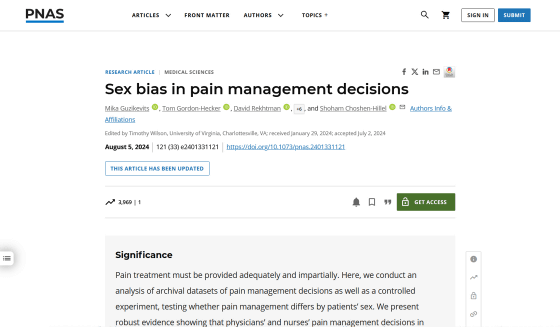Study finds that women are less likely to receive painkillers than men with the same pain

Pain is painful for everyone, but previous research has shown that
Sex bias in pain management decisions | PNAS
https://www.pnas.org/doi/10.1073/pnas.2401331121

Women Really Are Less Likely to Be Treated For Their Pain Than Men : ScienceAlert
https://www.sciencealert.com/women-really-are-less-likely-to-be-treated-for-their-pain-than-men
Recent research has revealed that many people have a prejudice that 'women exaggerate pain while men downplay it,' and it has been reported that even if two people grimace in response to pain in the same way, women tend to perceive the pain as less.
A review of studies investigating gender bias in pain treatment also found that women who report pain are more likely to be perceived as 'hysterical,' 'emotional,' 'fantasizing,' and 'lying.' Additionally, research has shown that women who report chronic pain are more likely to be misdiagnosed as having mental health issues.

A research team led by
The data included a total of 21,851 patients who visited a doctor complaining of pain, and the research team analyzed factors such as the patient's age, sex, reported pain level, diagnosed illness, frequency of emergency department visits, and prescription medications.
The analysis found that across the entire data set, female patients were consistently less likely to be prescribed pain medication than male patients, even after controlling for variables such as patient-reported pain scores and physicians, and that female doctors, as well as male doctors, prescribed fewer pain medications to women.
These disparities in pain treatment were not associated with any variables other than the patient's gender. Numerous studies have already shown that there are large disparities in the perception of pain reported by women and men, so the research team concluded that the reason for the disparities in treatment is bias among medical professionals.
In addition, the research team also conducted an experiment in which 109 medical professionals were presented with a scenario of a 'patient with severe back pain' and asked to evaluate the degree of pain of the patient. The results showed that when the patient was female, the pain was rated lower than when the patient was male.

The research team commented, 'This study provides strong evidence of gender bias against female patients among health care professionals in pain management. We cite stereotypical perceptions of women's pain as one potential mechanism underlying this bias. ' They argued that psychological bias in health care settings needs to be addressed to provide fair and effective treatment for all.
Related Posts:
in Science, Posted by log1h_ik







